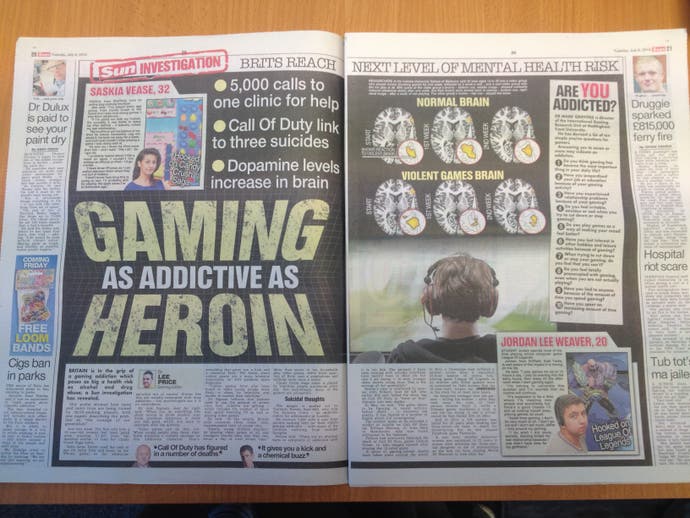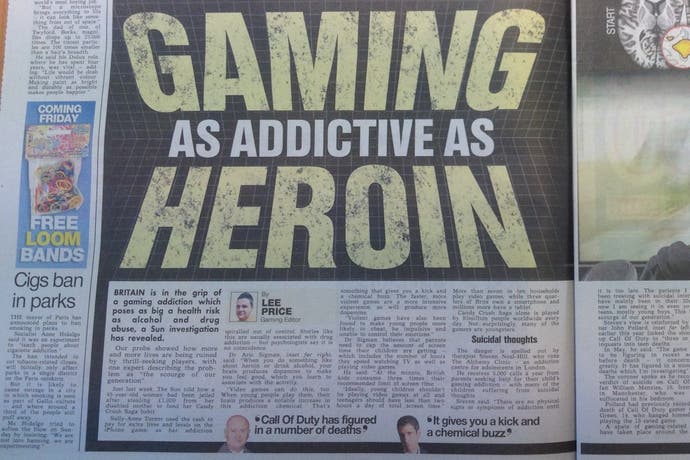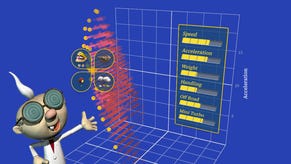The real story behind The Sun's "Gaming as addictive as heroin" headline
Is Britain really "in the grip of a gaming addiction"?
UK newspaper The Sun has been getting stick today for an article it published which carried the headline: "Gaming as addictive as heroin." But what's the real story?
The Sun's investigation carries the following introduction:
"Britain is in the grip of a gaming addiction which poses as big a health risk as alcohol and drug abuse."
The piece (it's online but behind a paywall) points to one London based clinic which claims it receives 5000 calls a year from parents seeking help for their child's gaming addiction.
It claims there is a "Call of Duty link to three suicides", and "dopamine levels increase in brain".
There are case studies, too. One student called Jordan, from East Yorkshire, says he spends 12 hours a day playing League of Legends. Saskia, from Sheffield, says she spends £100 a week on apps such as Candy Crush. The article also references a number of cases of game-related deaths from around the world.
And in a box out, Dr Mark Griffiths, director of the International Gaming Research Unit at Nottingham Trent University, offers a list of 10 yes/no questions for gamers to answer. If they answer yes to seven or more, they may be addicted.
It's an article that rekindles memories of similar reports published by the mainstream press over the years, and makes similar points. But is it accurate?

Let's start with the headline: "Gaming as addictive as heroin."
Eurogamer asked Dr Griffiths, who contributed to The Sun's article, for his take.
"It depends how you define addiction in the first place," he said.
"I've spent my whole career trying to say if you're going to call something an addiction it has to be similar right across the board. The criteria I use for video game addiction would be exactly the same as in heroin addiction in the sense that this is an activity that becomes the most important thing in your life, it compromises everything else in your life including your relationship, work and hobbies.
"It's something you use as a way of modifying your mood. It's something that builds up tolerance over time, so you need more and more. It's something where you get withdrawal symptoms if you're unable to engage in it. And it's something that if you do manage to give up for a short time when you do the activity again you relapse.
"The good news from my perspective is on those particular criteria, the number of genuine video game addicts is few and far between. If we're talking about genuine video game addiction, it doesn't matter what the activity is if we're using the same criteria.
"It's a bit like that trick question my physics teacher used to give us, which was, if you've got a tonne of feathers and a tonne of lead, which weighs heavier? Most kids put down a tonne of feathers, but the whole point is it's a tonne.
"It's quite clear that some, whether it's kids or young adults, have some problems around the fact they seem to be unable to control the amount of time they spend gaming, and maybe it's impacting other areas of their life. But just because there are some addictive-like components there it doesn't mean they're genuinely addicted."
The second sticking point is The Sun's introduction, which claims "Britain is in the grip of a gaming addiction".
This, Griffiths said, was "incorrect".
"I've spent well over 25 years studying video game addiction. If we're we're going to use the word addiction we have to use the same concepts, signs and symptoms we find in other more traditional addictions, like withdrawal and tolerance. By doing that the number of people who end up being addicted by my criteria are actually few and far between," he said.
"The little thing I did for The Sun is actually based on real criteria I use in my research. The number of people who would score seven out of 10 of those items I put in The Sun today, I'd find it very hard to believe there would be more than a handful of people out there that would score high on all those things. You'd probably get a lot of people who might endorse three or four of them, but that doesn't mean they're addicted. That might be somebody who has problems with it.
"Most kids can afford to play three hours a day without it impacting on their education, their physical education and their social networks. Yes, I believe video game addiction exists, and if it is a genuine addiction it may well be as addictive as other more traditional things in terms of signs, symptoms and components. But the good news is it is a very tiny minority who are genuinely addicted to video games."
Griffiths concluded: "I got asked to provide a little diagnostic test some readers could do without seeing what The Sun had done. There is no evidence the country is in 'the grip of addiction'. Yes, we have various studies showing a small minority have problematic gaming. But problematic gaming doesn't necessarily mean gaming addiction. They're two very separate things. Yet the media seem to put them as the same."
The Sun's headline is of course an attempt to draw in the reader with an eye-catching - and shocking - statement. Perhaps we shouldn't be too surprised by that. Newspaper headlines and the articles they sell are often created by separate teams - teams that sometimes disagree with each other.
It is the overall tone of the article that is of more interest. As the saying goes around the newsroom: bad news is good news.
"Every time I do a piece of research, if it's something that's negative, 90 per cent of the press cover it," Dr Griffiths said. "If it's something positive, 10 per cent of the press cover it. Bad news stories sell."
Dr Jo Twist, CEO of Ukie, told Eurogamer The Sun's article ignored the positive effects of playing games and the fact millions play safely and sensibly.
"There is currently no official medical diagnosis of video game addiction, either from the American Medical Association or the World Health Organization," she told Eurogamer.
Ukie, Dr Twist said, was trying to convince the mainstream press to cover more positive video game-related stories.
"A big focus for Ukie this year is to get more proactive positive press stories into national news to dispel these kinds of pieces and we will be working hard over the next few months to achieve this."









